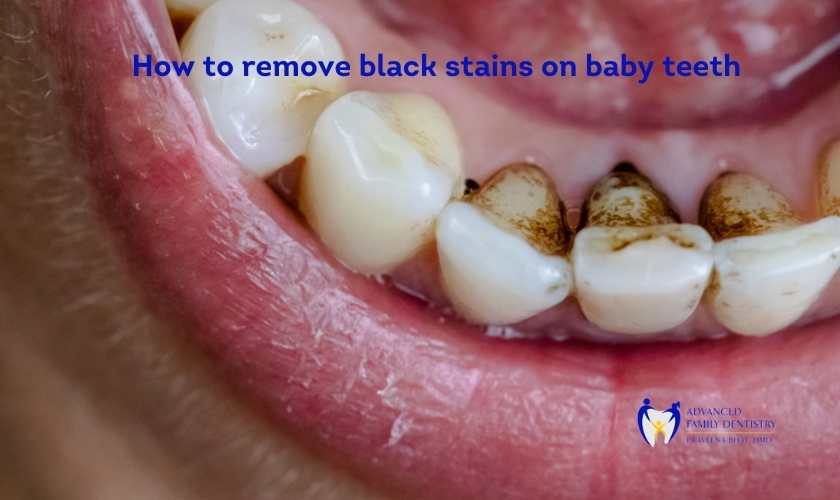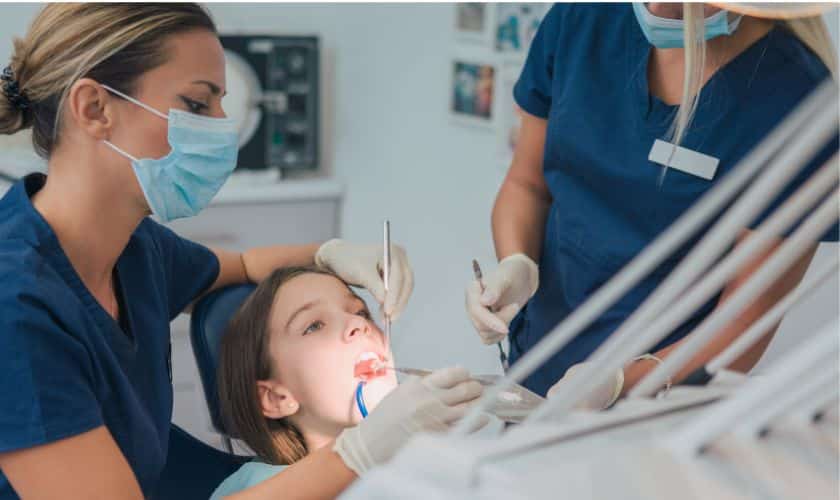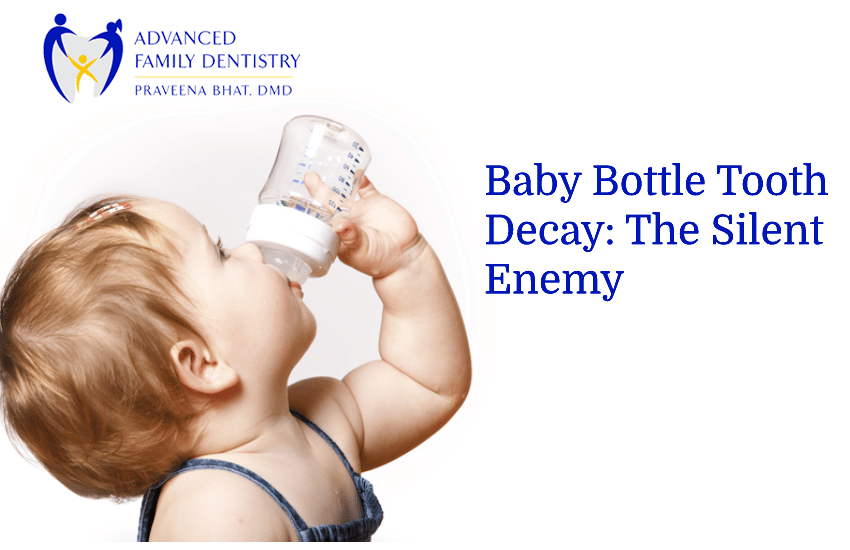Top Family, Cosmetic and Implant Center In 537 Amherst St, Nashua, NH 03063
Effective Ways to Remove Black Stains on Baby Teeth in Nashua

As your precious little one in Nashua grows, witnessing those first pearly whites emerge is a moment of pure joy. But sometimes, those pearly whites might develop some uninvited guests – black stains. While these might raise concerns, fret not! This blog post will be your guide to understanding black stains on baby teeth in Nashua.
Baby teeth, also known as primary teeth, pave the way for permanent teeth. They typically start erupting around 6 months of age and complete the set by around 3 years old. These little teeth play a crucial role in speech development, chewing, and guiding permanent teeth into their proper positions.
However, during this development stage, some babies might develop black or brown stains on their primary teeth. This can be a cause for concern for parents in Nashua. Let’s delve deeper into the causes and solutions for these black stains.
Causes of Black Stains on Baby Teeth
Several factors can contribute to black stains on baby teeth in Nashua. Here’s a breakdown of the most common culprits:
- Iron Supplements: Iron supplements, often prescribed to infants with iron deficiency, can leave dark stains on teeth. These stains are usually harmless and don’t damage the teeth themselves.
- Diet: Sugary foods and drinks can create a breeding ground for bacteria in the mouth. These bacteria produce acid that can erode tooth enamel, making teeth more susceptible to staining from food and drinks with strong pigments like berries, juices, or soy sauce.
- Poor Brushing Habits: As little ones are still developing fine motor skills, thorough brushing might be a challenge. This allows plaque buildup, which can harbor bacteria and cause staining.
- Fluorosis: While crucial for strong teeth, excessive fluoride intake during tooth development can cause mild discoloration, including brown or black stains. This is more common in areas with fluoridated water supplies.
- Trauma: If a baby tooth experiences a blow or injury, it can affect the blood supply to the tooth, leading to discoloration.
The Importance of Addressing Black Stains on Baby Teeth
While black stains might not always be a cause for immediate alarm, addressing them is important. Here’s why:
- Early Detection of Cavities: Sometimes, black stains can mask underlying cavities. Early detection and treatment of cavities prevent further damage and discomfort for your child.
- Oral Health Habits: Addressing staining issues early on encourages good oral hygiene habits that benefit your child’s overall dental health.
- Confidence and Well-being: Black stains might cause self-consciousness in some children, affecting their confidence and well-being.
Home Remedies for Removing Black Stains on Baby Teeth
For mild black stains on baby teeth in Nashua, some safe home remedies can be tried, along with consulting your pediatrician or dentist:
- Brushing with a Soft-Bristled Toothbrush: Use a gentle, age-appropriate toothbrush with fluoride toothpaste twice a day. Focus on brushing for at least two minutes, reaching all surfaces of the teeth.
- Wipe with a Damp Washcloth: After meals and before bedtime, gently wipe your child’s teeth with a clean, damp washcloth to remove surface stains and food particles.
- Dietary Changes: Limit sugary foods and drinks that contribute to staining. Offer water as the primary beverage and encourage a healthy diet rich in fruits and vegetables.
Professional Treatment Options for Black Stains on Baby Teeth
For stubborn or concerning black stains, your Nashua dentist might recommend professional cleaning or other treatments. Here are some options:
- Professional Cleaning: Dentists use specialized tools and techniques to remove deep stains and plaque buildup.
- Polishing: Polishing removes surface stains and creates a smoother tooth surface, making it less susceptible to future staining.
- Bonding: If a stain is caused by enamel damage, your dentist might use tooth-colored bonding material to restore the tooth’s appearance.
- Crowns: In severe cases, your dentist might recommend a crown (a cap placed over the tooth) if the tooth structure is significantly compromised.
Tips to Avoid Black Stains on Baby Teeth
- Start Oral Hygiene Early: Even before teeth erupt, wipe your baby’s gums with a clean, damp washcloth after feedings to remove milk residue and establish a routine for oral care.
- Regular Dental Visits: Schedule regular dental checkups and cleanings for your child starting at around one year of age. This allows early detection of any potential issues and promotes good oral hygiene habits.
- Fluoride Therapy: Discuss fluoride supplements or treatments with your dentist, especially if your area doesn’t have fluoridated water. Fluoride strengthens developing teeth and helps prevent cavities and staining.
- Supervise Feeding Habits: Don’t let your child fall asleep with a bottle filled with milk, juice, or formula. The sugars in these liquids can pool around the teeth and promote bacterial growth and staining.
- Offer Alternatives to Sugary Drinks: Instead of sugary juices or sodas, offer water or unsweetened milk as primary beverages.
- Promote Healthy Food Choices: Encourage a balanced diet rich in fruits, vegetables, and whole grains to provide essential nutrients for healthy teeth.
Conclusion
Black stains on baby teeth in Nashua, while not always a major concern, deserve attention. By understanding the causes and taking proactive steps, you can help your child maintain a healthy and beautiful smile. Remember, early detection and good oral hygiene habits are key. Don’t hesitate to consult your Nashua pediatric dentist if you have any concerns or questions. With a little effort and collaboration, you can ensure your little one’s smile shines bright!




